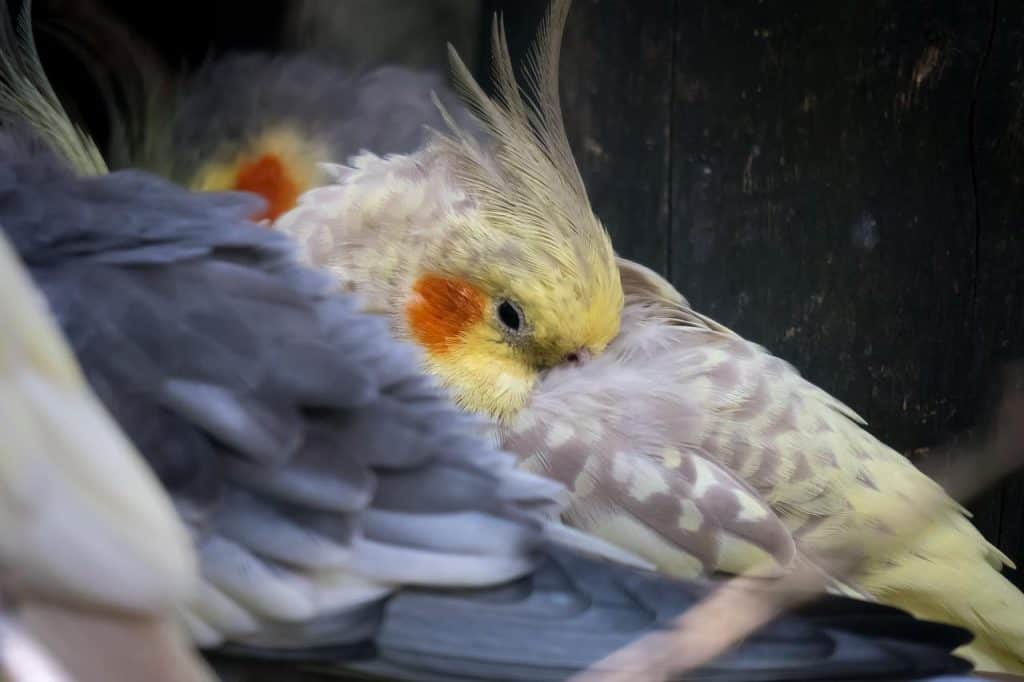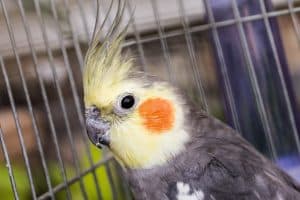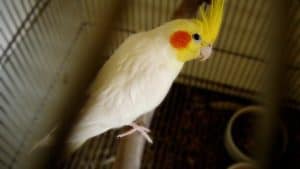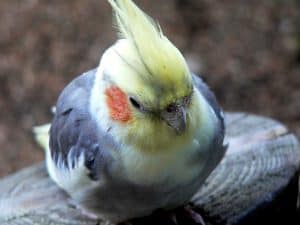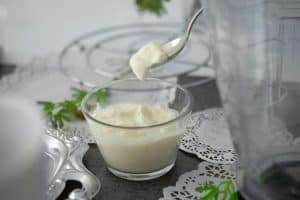Cockatiels are beautiful, popular pet birds. They’re known for being friendly, social creatures that love to interact with their owners. You may love your cockatiel, but there’s one thing you definitely don’t want to share with your feathered friend—fleas! These tiny parasites can not only make your cockatiel very uncomfortable, but they can also transmit diseases. So, can cockatiels get fleas?
Can cockatiels get fleas?
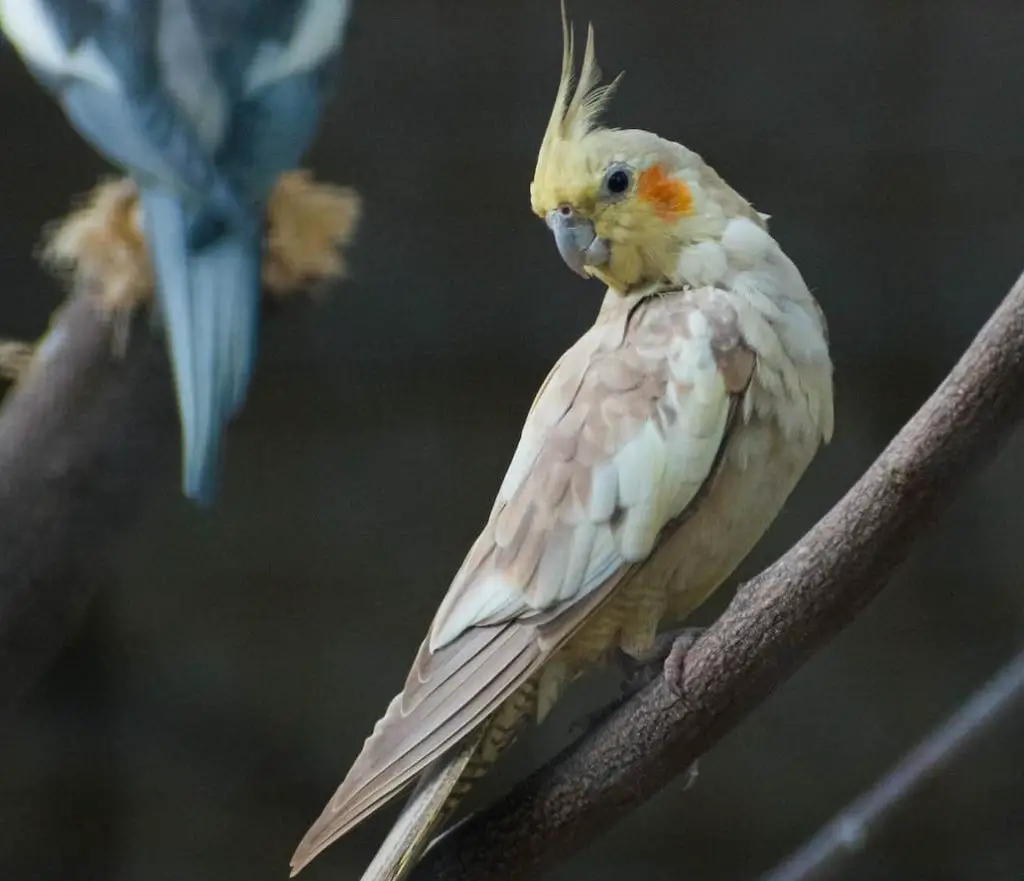
As it turns out, the answer is yes—cockatiels can occasionally get fleas. Birds can get fleas however, it’s fairly uncommon to pick up fleas from the environment. Instead, they usually contract fleas from another pet in the household, such as a cat or dog. If you think your cockatiel has fleas, the best thing to do is take him to the vet for a checkup.
What are bird fleas and what do they look like?
Bird fleas are tiny, wingless insects that subsist on the blood of their avian hosts. These are brownish insects or black and have flattened bodies, which makes them well-suited for moving through feathers. Female bird fleas can lay up to 50 eggs per day, and the eggs hatch within 10 days. Once hatched, the flea larvae burrow into the ground to pupate. The entire life cycle from egg to adult takes about three weeks.
Fleas are a nuisance for any pet, but they can be especially problematic for birds. That’s because fleas on birds can transmit a number of diseases, including avian malaria and avian pox. In addition, flea bites can cause anemia in birds, and a heavy infestation can even lead to death.
Signs of a flea infestation in cockatiels
Cockatiels are susceptible to the same parasites as other animals, including fleas. If your cockatiel has fleas, you may notice him or her scratching more than usual. Additionally, you may see tiny black specks on the feathers or skin of your pet bird. These black specks are actually the feces of the fleas; when mixed with your bird’s blood, they appear black.
If the mite infestation is heavy, you may also see bare patches of skin on your cockatiel where he or she has been excessively scratching. In extreme cases, anemia can occur, and your cockatiel may appear lethargic and have pale gums. If you think your cockatiel has fleas, it’s important to take him or her to the vet right away.
How do I treat my cockatiel for fleas?
Fortunately, there are a few different options for treating fleas in cockatiels. Your vet will likely recommend an insecticide that is safe for use in birds. This insecticide will kill the fleas and their eggs and should help to alleviate your cockatiel’s discomfort. In some cases, your vet may also recommend using an insect growth regulator (IGR), which will prevent the fleas from reproducing.
How do cockatiels get fleas?

There are two primary ways that cockatiels can get fleas: by coming into contact with other animals that have fleas or by being exposed to an environment that is infested with fleas (e.g., a nest box that contains fleas). For this reason, it’s important to keep your cockatiel away from other animals—including other birds—that may have fleas. Additionally, you should regularly inspect your bird’s environment for any signs of a flea infestation (e.g., tiny black specks on surfaces).
How to prevent flea infestations in cockatiels?
The best way to prevent a flea infestation in your cockatiel is to avoid contact with animals that have fleas and to regularly inspect your bird’s environment for signs of an infestation. Additionally, there are several products on the market that can be used to prevent flea infestations in birds, including sprays and powders that can be added to your bird’s bath water.
To get rid of fleas, you’ll need to treat both your bird and his or her environment. Be sure to consult with your veterinarian before using any medications or treatments on your cockatiel, as some products can be harmful to birds.
How to treat flea infestations in cockatiels?
If your cockatiel does develop a flea infestation, don’t worry—there are several effective treatments available. The most common treatment is topical spot-on treatments that are applied directly to your bird’s skin; these treatments work by killing the fleas on contact. Additionally, oral medications are available that can be added to your bird’s food or water; these medications work by killing the fleas from the inside out. Your vet will be able to recommend the best treatment option for your individual situation.
The infected bird should be quarantined and treated as soon as possible to prevent the spread of the infestation. All birds in the household should be treated, even if they don’t currently have any symptoms. In addition, the environment should be spotless and disinfected to prevent re-infestation.
Common bird fleas
Hen flea- Ceratophyllus gallinae: This is the most common type of flea found on chickens and other poultry.
Sticktight flea- Echidnophaga gallinacea: This type of flea is most commonly found on wild birds, but can also be found on domestic poultry.
Northern fowl mite- Ornithonyssus sylviarum: This type of flea is most commonly found in poultry, but can also be found on other birds, such as canaries and finches.
Avian flea- Ceratophyllus sciuri: This type of flea is most commonly found on rodents, but can also be found on other small animals, such as birds.
Tropical bird flea- Ceratophyllus niger: This type of flea is most commonly found on wild birds, but can also be found on domestic poultry.
Moorhenflea- Dasypsyllus gallinulae: This type of flea is most commonly found on waterfowl, such as moorhens and ducks.
Duck flea- Ceratophyllus niger: Duck fleas are found almost exclusively on wild ducks but can also be discovered feeding on domestic poultry.
Parrot flea- Ceratophyllus ornithogaster: Parrot fleas are found almost exclusively on parrots but can also be discovered feeding on other birds, such as cockatiels.
Do wild birds have fleas?
Yes, wild birds can have fleas. In fact, there are several species of fleas that specifically target birds, such as the duck flea, hen flea, and moorhen flea. These fleas typically infest birds that reside in ground-built nests or semi-cavity nests. Although wild birds can carry fleas, it is essential to note that the types of fleas that infest birds are generally different from those that infest mammals like cats and dogs. However, wild birds can still potentially spread fleas to pets, including pet birds and other mammals, if they come into contact with each other or share a flea-infested environment.
Do birds eat fleas?
Birds will eat fleas if they are present in the environment, but it is not a common occurrence. If you think your bird may have eaten a flea, it is important to watch for signs of illness, such as lethargy, reduced appetite, and increased thirst.
Are there any other parasites that can affect cockatiels?
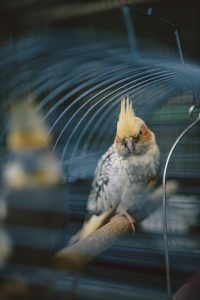
Cockatiels can also be affected by other parasites, such as bird mites or feather mites and lice. These cockatiel parasites can cause irritation and discomfort for your bird, so it’s important to take steps to prevent them. The best way to prevent parasites is to keep your cockatiel’s environment clean and to regularly inspect your bird for any signs of an infestation. Additionally, there are several products on the market that can be used to prevent parasites, including sprays and powders that can be added to your bird’s bath water. If you think your cockatiel has parasites, it
Is there anything else bird owners should know about keeping their feathered friends healthy and happy?
In addition to preventing parasites, there are several other things you can do to keep your cockatiel healthy and happy. Cockatiels need a diet that is high in protein, so be sure to offer your bird a variety of foods, such as seeds, pellets, fruits, and vegetables. Additionally, cockatiels need a source of fresh water at all times; a water bottle is the best option, as it helps to prevent contamination.
Cockatiels also need a place to bathe; a bird bath or a spray bottle can be used to provide your bird with the water it needs. Finally, cockatiels need a place to perch and exercise; a bird cage or aviary is the best option, as it provides your bird with plenty of space to move around.
Summary: Can cockatiels get fleas?
Fleas are most commonly found on wild birds but can also be found on domestic poultry. The best way to prevent fleas is to keep your cockatiel’s environment clean and to regularly inspect your bird for any signs of an infestation. If you think your cockatiel has fleas, it is important to consult with your veterinarian to choose the best treatment option.
Other suggested articles:
How can your other pets be harmful to your cockatiel?
Cockatiel Limping: Causes, Symptoms, and Treatments to Consider
